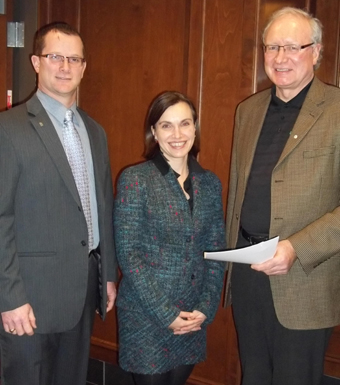
During an information session about the LIENS immigrant integration program Jan. 14 in Charlottetown, MacLauchlan and other speakers offered striking statistics and statements that opened the eyes of several of the more than 40 participants at the event.
They mentioned, among other things, that the province is expecting the loss of 40 per cent of its workforce within the next 40 years, mostly because of declining birthrates, the increasing mortality rate of the aging population and the out-migration of Islanders to other parts of the country.
The effects of this phenomenon are already being felt. In fact, some employers say they are facing a shorting of skilled workers since they’re having a hard time recruiting employees in PEI and in Canada that are qualified for their specialized positions. The speakers noted that 40 per cent of Islanders haven’t acquired a level of literacy or numeracy to allow them to complete their high school studies.
MacLauchlan suggested, during his speech entitled “Demographics and Destiny: A Challenge for PEI”, that the Island follow the example of Manitoba, which developed its own immigration strategy. That province has been able to retain 85 per cent of its immigrants, which is much higher than the results attained by all other provinces.
This Western province figured out how to align its realities along with the skills of its current and immigrant workers with existing and potential opportunities within the local work market, in an effort to create sustainable jobs. PEI should follow that lead, he suggests.
COMMUNITY APPROACH
For PEI to succeed in its immigrant recruiting efforts, all players will have to work together, they will have to maintain an open mind that is both welcoming and authentic and the host community must be completely convinced of the approach being used. MacLauchlan believes the approach has to be community-based rather than government-based.
“Do we invite newcomers to come into our homes for supper?” he asked.
According to a study, the province of PEI foresees the establishment of 300 newcomers on the Island every year. The guest speaker feels this number “isn’t very optimistic”; if a proactive and strategic approach is used, that number could easily be raised to 2,000 a year, he says. In fact, that number has been consistently surpassed in the last few years.
MacLauchlan suggest that PEI’s efforts be directed towards people from other countries who are already here – such as temporary workers and international students – since they already know a bit about the local lifestyle. It would also be a good idea to examine the world situation to determine which countries and areas are most apt to suit PEI’s needs. For example, it was noted that the unemployment rate for young people in Portugal, Spain and France is currently extremely high. And why not consider Mexicans since literally millions of them move to the United States seeking work.
WHY IMMIGRANTS?
A second speaker – Lori-Ann Cyr, executive director of Diversis Inc. – offered a whole lists of advantages of hiring immigrants during her presentation entitled “Hiring Newcomers: A Solution?”
She said they contribute new skills and knowledge, they have networks of international contacts, they are familiar with international markets and commercial policies of other countries, they bring innovative approaches and perspectives to the table and they often have advanced linguistic skills that can help companies broaden their clientele and markets. They also tend to be extremely loyal.
Invited to present a testimonial, Patrick Charles of DeltaWare in Charlottetown explained the firm employs 110 people; 30 per cent come from other countries. According to his experience, after a few months of adaptation, newcomers perform as well as local people. The biggest challenge he’s noticed is often language. But on the flip side of the coin, they often contribute new ideas and new ways of doing things, which makes them extremely valuable to the business.
The speakers explained that before hiring immigrants, employers must advertise their positions at least two weeks in their own country to see if they can find qualified Canadians.
The LIENS project (Linking immigration to our successes) is an initiative lead by RDÉE Prince Edward Island Inc.
-30-
CUTLINE: Martin Marcoux, left, president of RDÉE Prince Edward Island, welcomes the two main guest speakers at the Jan. 14 information session on hiring immigrants: Lori-Ann Cyr, executive director of Diversis Inc., and Wade MacLauchlan, businessman and former president of UPEI.
For more information:
Angie Cormier
Coordinator, LIENS project
(902) 370-7333
angie@rdeeipe.org
